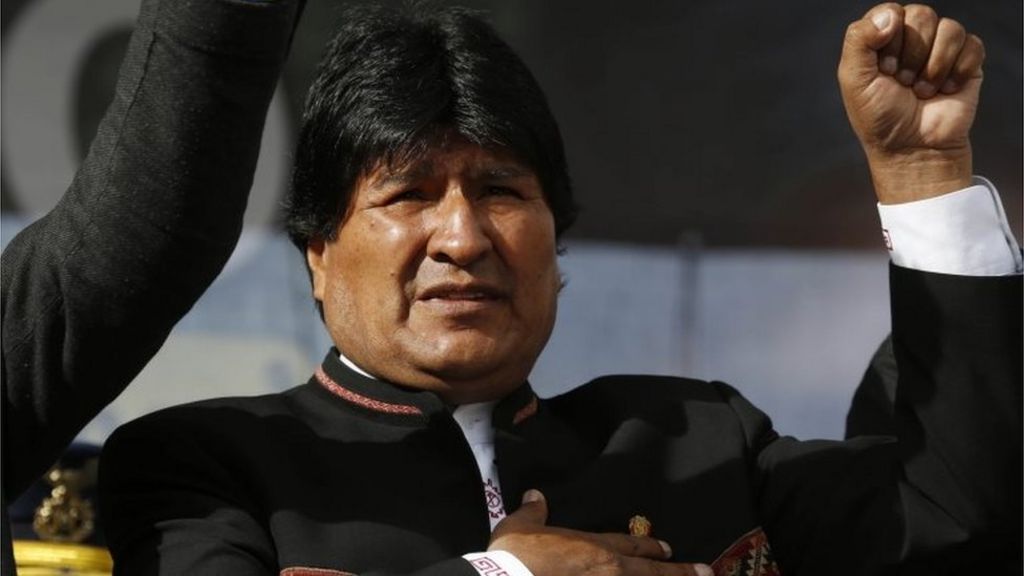- UID
- 20
- Online time
- Hours
- Posts
- Reg time
- 24-8-2017
- Last login
- 1-1-1970
|
|
━━━━━━━━━━━━━━━━━

▼ With almost 14 years as president of Bolivia under his belt, Evo Morales is one of the longest serving leaders in Latin America.
After a controversial decision by the constitutional court to scrap presidential term limits, Mr Morales is running for a fourth consecutive term in office.
Ahead of the elections on 20 October, BBC News looks at some highs and lows of his political career so far.
Reclaiming the coca leaf
Evo Morales was born in a rural village in the western Oruro region into a family from the Aymara indigenous group.
He cut his political teeth as the leader of a union of coca growers. Coca, the raw ingredient of cocaine, has been used in the Andes for thousands of years for religious purposes as well as to combat altitude sickness and as a mild stimulant.
Mr Morales first ran for president in 2002, promising to govern in favour of Bolivia's indigenous people, who had suffered centuries of marginalisation and discrimination.
While not successful at first, he won the top job on his second attempt in December 2005.
Once in power, he threw his weight behind a new constitution, which officially declared Bolivia as "plurinational" and secular in order to better reflect Bolivia's dozens of ethnic groups.
He also continued to fight for the rights of coca farmers, keeping coca-growing legal and introducing measures to regulate its trade despite pressure from the United States to eradicate the crop altogether.
The US authorities have accused President Morales of not doing enough to stem cocaine production and trafficking, while he insists he is combating cocaine production while allowing small amounts of coca to be grown for religious and cultural purposes.
Mr Morales's relations with the US have been strained throughout his presidency.
In 2008, he expelled US Ambassador Philip Goldberg, accusing him of conspiring against his government, and suspended the operations of the US Drug Enforcement Administration in Bolivia.
In 2013, he also ousted the US Agency for International Development(USAID), accusing it of supporting his opposition.
Wealth distribution
Mr Morales was part of the so-called "pink tide" of left-wing leaders which swept to power across South America in the early 2000s, a tide which has since ebbed with most of the left-wing leaders replaced by conservative governments.
An avowed socialist, Mr Morales cut his own salary and the salaries of those in his cabinet shortly after taking office.
He then began the process of renationalising the oil and gas industries. The increased tax revenue allowed Bolivia to vastly increase its public investment and helped boost the country's foreign reserves.
The administration invested heavily in public works projects and social programmes to fight poverty. Since he came to office, extreme poverty dropped from 38% in 2006 to 17% in 2018. However, his critics point out that in the last two years, the levels of extreme poverty have been on the rise again.
President Morales's left-wing policies worried and in some cases antagonised many middle-class Bolivians who saw him as too radical.
Opposition has been concentrated in the wealthy eastern lowland province of Santa Cruz, Bolivia's economic powerhouse.
His critics also accuse him of failing to tackling corruption, which many Bolivians have named as their main concern in the 2019 presidential election.
Access to the sea
One of his main defeats has been his failure to secure landlocked Bolivia access to the sea in a dispute with neighbouring Chile, a topic of national pride for many Bolivians.
The country lost its access to the Pacific Ocean in 1884 after a war with Chile and has tried to regain it ever since.
In October 2018, the International Court of Justice ruled in favour of Chile- a major setback for Mr Morales, who had assured Bolivians that victory was "very close".
Evo Morales has regularly spoken at international climate conferences, where he has argued for greater respect for "Mother Earth".
However, he has not always been successful in balancing that intention with economic development.
One of the most contentious issues of his presidency involved plans for the construction of a major road through the Amazon, which indigenous groups argued would open their territory up to illegal logging and land grabs.
Large-scale protests led to violent clashes and forced the government to backtrack in 2011. The project later got the go-ahead in 2017, with Mr Morales dismissing international concern as a form of "colonial environmentalism".
More recently, in 2019, Evo Morales has faced protests over fires, which have raged in protected eastern areas of the country.
Demonstrators have called for him to revoke a decree that authorised "controlled burning" to help farmers create bigger plots for crops.
Extending power
Many of those who turned out to protest against Mr Morales's response to the fires also carried placards accusing him of ignoring the result of a 2016 referendum.
The question posed in the referendum was whether Bolivians wanted to drop the term limits which limit the number of terms Bolivian presidents can serve.
A majority voted "no" but President Morales's party took the issue to the constitutional court, which abolished the term limits altogether.
Critics of Mr Morales say that his government has ridden roughshod over the will of the people by standing for a fourth term in office.
Mr Morales argues he needs more time to carry out all the reforms he has set off to achieve. The elections on 20 October will show how many Bolivians back his plans.
► This article was originally published here: Source |
|